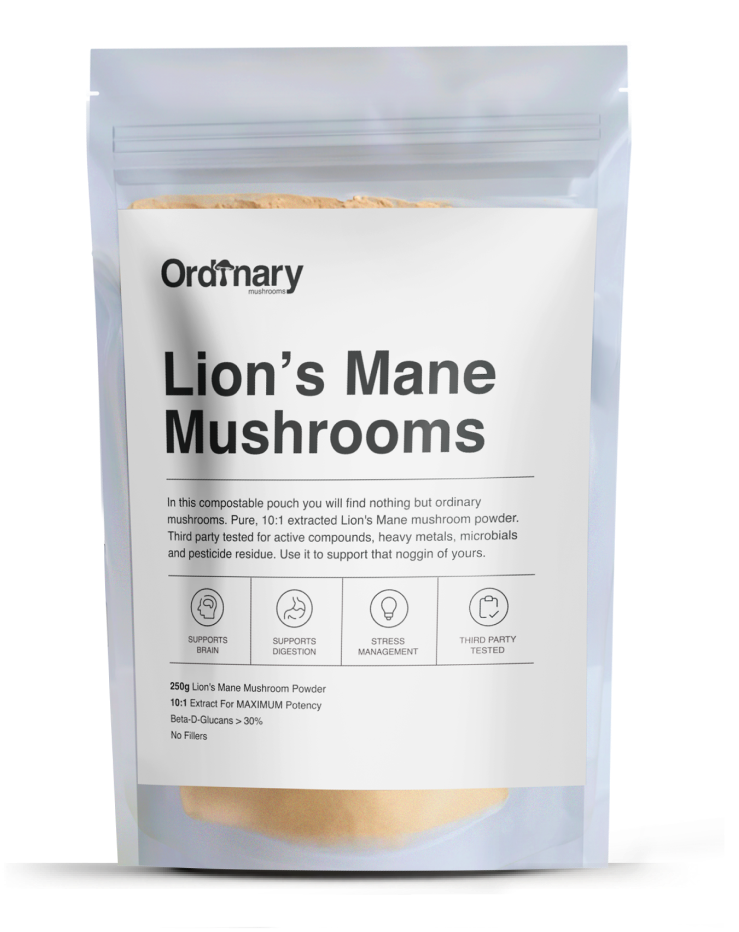Lion’s Mane mushroom, scientifically known as Hericium erinaceus, is a captivating and highly regarded natural remedy with potential health benefits. Its unique appearance and rich composition of bioactive compounds have sparked interest in its ability to support brain health, cognitive function, immune system function, and nerve regeneration. Additionally, Lion’s Mane offers versatility in culinary applications, adding a delicate, seafood-like flavor to various dishes. While further research is needed, Lion’s Mane presents an intriguing option for those seeking natural remedies and culinary exploration.


As a revered natural remedy, Lion’s Mane (Hericium erinaceus) has captured the attention of many due to its unique characteristics and potential health benefits. With its striking appearance resembling a lion’s mane, this remarkable mushroom contains bioactive compounds that hold promise in supporting brain health, cognitive function, immune system function, and nerve regeneration. Its culinary versatility, with a delicate seafood-like flavor, adds a delightful touch to various dishes. While further research is underway to fully understand its capabilities, Lion’s Mane stands as a captivating option for those seeking natural solutions and exploring new culinary experiences.
Overview
History and traditional uses
Modern applications and research
Overview backed by scientific studies
Health conditions and symptoms
Medicinal Mushrooms In History
While nearly everyone has a favourite flower, and some people admit to a love affair with indoor plants, only a few profess their passion for mushrooms. A popular recreational activity is that of mushroom foraging. It’s tremendously fascinating to spend weekends in the bush searching and identifying mushroom species since mushrooms grow only in certain areas at specific times of the year in the wild. Some mushrooms can only be found near specific tree species.
Mushrooms are often prized for their culinary qualities, but serious research demonstrates how important mushrooms are in everyday living. As supplements, mushrooms are a rich source of nutrients. Many natural healers believe medicinal mushrooms should be regarded with equal or even greater value than some medicinal herbs.
Fascinating in every aspect, the use of mushrooms for their medicinal qualities and health benefits throughout history is an equally enchanting tale that stretches to every corner of the world.



Egypt
Egyptian hieroglyphics depict mushrooms as the plant of immortality, with mushrooms being referred to as “sons of the gods” and being transported to Earth on lightning bolts by the god Set. As a result, mushrooms were exclusively consumed by nobility and pharaohs. Similarly, the Aztecs also possessed sacred mushrooms, which they called “the flesh of the gods” and ingested as part of religious ceremonies.
Europe
The oldest human mummy, known as Ötzi, also called “Iceman”, was discovered with Piptoporus betulinus and Fomes fomentarius in his medical bag. Piptoporus betulinus is a fungus utilised for its antibacterial capabilities and as a natural anti-parasitic that is still used today, and Fomes fomentarius is an anti-inflammatory and used to start and transport fires. Iceman’s remains were found in the Northern Ötzal Alps and, when carbon dated, were found to be approximately 5300 years old.
The Vikings are said to have used hallucinogenic mushrooms before combat, which would have resulted in the savage fighting condition for which they are renowned in history.
China
For thousands of years ‒ estimates vary from 3-7,000 years ‒ medicinal mushrooms have been utilised in traditional Chinese medicine. Tao Hongjing, a 5th-century alchemist, mentioned numerous therapeutic mushrooms. The reishi mushroom is known for its immune-boosting and mood enhancement properties, and Dendropolyporus umbellatus (umbrella polypore) is commonly used for urological disorders.
Between 600 and 1000 AD, the Chinese devised cultivation methods for medicinal and culinary mushrooms to fulfill the ever-increasing demand. For example, from about 1000 AD, the famed shiitake mushroom has been widely cultivated. Today China is responsible for about an estimated 70% of the worlds mushroom production.
Medicinal Mushrooms In A Modern Era
Modern science now understands that we are an ecosystem, live in an ecosystem, and were born from an ecosystem. Mycologists understand the role of mushrooms and their mycelia in ecosystems of which we are a part and that their health benefits empower and complement conventional modern medicine. We are in the midst of a scientific revolution rapidly gaining traction in the field of medicinal mushrooms. Our forefathers would be proud.
Ordinary Mushrooms strives to be accessible and affordable to all, with a strong belief in our products’ capacity to enhance your state and naturally support your health and vitality. We believe in mycology and evidence of the medicinal qualities of mushrooms that stems back for generations.
For your medicinal mushrooms, browse our shop, and be sure you subscribe to our newsletter to receive mushroom information, recipes, and updates on local initiatives!

Boosts Immune System: Lion’s Mane has been shown to enhance immune system function. By promoting the production of immune cells, it helps the body defend against pathogens and infections, leading to improved overall health.
Supports Digestive Health: Lion’s Mane contains bioactive compounds that aid in maintaining a healthy gut. It can help improve digestion, reduce inflammation in the digestive tract, and support the growth of beneficial gut bacteria.
Enhances Mood and Mental Well-being: Regular consumption of Lion’s Mane has been associated with improvements in mood and overall mental well-being. It may help alleviate symptoms of anxiety and depression by promoting the production of neurotransmitters like serotonin and dopamine.
Promotes Heart Health: Lion’s Mane has potential benefits for cardiovascular health. It may help reduce levels of bad cholesterol (LDL) while increasing good cholesterol (HDL), leading to a healthier heart and reduced risk of cardiovascular diseases.
Supports Healthy Skin: Lion’s Mane contains antioxidants and anti-inflammatory compounds that can help improve the appearance and health of the skin. It may aid in reducing skin inflammation, enhancing collagen production, and promoting a youthful complexion.
Enhances Athletic Performance: Lion’s Mane has been shown to have potential benefits for athletes and fitness enthusiasts. It may improve exercise performance by reducing fatigue, increasing endurance, and supporting muscle recovery.
Boosts Energy and Focus: Regular consumption of Lion’s Mane may enhance energy levels and improve cognitive function. It can provide a natural boost to mental clarity, focus, and concentration, helping individuals stay alert and productive throughout the day.
Supports Nerve Regeneration: Lion’s Mane has been found to have neuroprotective properties and may support nerve regeneration. This can be particularly beneficial for individuals recovering from nerve injuries or those dealing with conditions affecting the nervous system.
Please note that it’s important to consult with a healthcare professional or conduct thorough research before incorporating Lion’s Mane or any other supplement into your routine to ensure it aligns with your specific needs and health conditions.
Lion’s Mane may potentially help with the following health conditions and symptoms:
Cognitive Decline: Lion’s Mane’s ability to improve nerve function and reduce inflammation may be beneficial for individuals experiencing cognitive decline, such as those with Alzheimer’s disease or dementia. It may help alleviate symptoms and support overall brain health.
Anxiety and Depression: Lion’s Mane’s mood-enhancing properties can potentially help reduce symptoms of anxiety and depression. It may promote the production of neurotransmitters like serotonin and dopamine, which are involved in mood regulation.
Neurological Disorders: Lion’s Mane’s neuroprotective effects and potential for nerve regeneration make it a promising option for individuals with neurological disorders like multiple sclerosis (MS), Parkinson’s disease, or peripheral neuropathy. It may provide support for the nervous system and help manage symptoms.
Digestive Disorders: Lion’s Mane’s support for digestive health may be beneficial for individuals with digestive disorders, such as irritable bowel syndrome (IBS), gastritis, or leaky gut syndrome. It can help reduce inflammation in the digestive tract and support optimal gut function.
Inflammation and Immune Disorders: Lion’s Mane’s anti-inflammatory properties may be helpful for individuals with conditions characterized by chronic inflammation, such as rheumatoid arthritis or inflammatory bowel disease (IBD). It may help modulate the immune response and reduce inflammation throughout the body.
Skin Conditions: Lion’s Mane’s antioxidant and anti-inflammatory compounds may assist in managing various skin conditions, including acne, eczema, or psoriasis. It can help reduce inflammation, promote skin healing, and improve overall skin health.
Nerve Injuries and Pain: Lion’s Mane’s potential for nerve regeneration and its impact on nerve function may make it beneficial for individuals recovering from nerve injuries or experiencing neuropathic pain. It may aid in nerve repair and provide relief from pain symptoms.

It’s important to note that while Lion’s Mane shows promise in these areas, further research is needed to fully understand its effectiveness and determine appropriate dosage and treatment plans. Consulting with a healthcare professional is advisable before using Lion’s Mane or any other supplement for specific health conditions.
Lion’s Mane mushroom has gained some recognition in pop culture, particularly in the realm of wellness and natural remedies. While it may not have an extensive presence, here are a few references:
Podcasts and Health Influencers: Lion’s Mane has been mentioned and discussed in various health and wellness podcasts, where experts and influencers have highlighted its potential benefits for brain health and cognitive function.
Online Health Communities: Lion’s Mane has been a topic of discussion and exploration in online health communities, where individuals share their experiences and insights about its effects on mental well-being and overall health.
Books and Publications: Some books and publications focused on natural remedies and alternative medicine mention Lion’s Mane as a beneficial mushroom for brain health, citing its potential cognitive-enhancing properties.
Social Media: On platforms like Instagram and Twitter, users have shared their experiences and recipes featuring Lion’s Mane, highlighting its unique appearance and potential health benefits.
It’s worth noting that references to Lion’s Mane mushroom in pop culture may not be as prevalent as those for more mainstream topics. However, its growing popularity in wellness circles and its unique attributes have generated interest and discussions in various online platforms and alternative health communities.
While Lion’s Mane mushroom may not have received extensive attention in mainstream media, it has made appearances in a few notable instances:
While Lion’s Mane may not have achieved widespread recognition in mainstream media, its presence can be found in specific niches such as culinary shows, health magazines, natural health blogs, and select documentary films. As interest in natural remedies and holistic approaches to health continues to grow, it’s possible that Lion’s Mane will receive more attention in the media in the future.
Q: Are there any side effects or precautions associated with Lion’s Mane mushroom?
A: Lion’s Mane mushroom is generally considered safe for consumption and is well-tolerated by most individuals. However, some people may experience mild digestive discomfort or allergic reactions. As with any supplement or dietary change, it is recommended to start with a low dose and consult with a healthcare professional before use, especially if you have any underlying health conditions or are taking medications.
Q: How does Lion’s Mane affect the immune system?
A: Lion’s Mane mushroom has been studied for its potential positive effects on the immune system. It contains bioactive compounds, including polysaccharides and beta-glucans, which are believed to stimulate and modulate the immune response. These compounds may help enhance the production and activity of immune cells, such as natural killer cells and macrophages, which play crucial roles in defending the body against pathogens and infections. However, more research is needed to fully understand the mechanisms and extent of Lion’s Mane’s effects on the immune system.
Q: What’s the best way to take Lion’s Mane supplements?
A: The best way to take Lion’s Mane supplements can vary depending on personal preference and the specific product. Generally, Lion’s Mane supplements are available in capsule or powdered form. Capsules offer a convenient and standardized dosage, while powdered supplements provide flexibility in adjusting the dose and can be easily added to food or beverages. When taking Lion’s Mane capsules, follow the dosage instructions provided by the manufacturer. It’s typically recommended to take them with a glass of water or as directed by a healthcare professional. If using powdered Lion’s Mane supplements, they can be mixed into smoothies, teas, or other beverages. You can also incorporate the powder into recipes like soups, sauces, or baked goods. Start with a small amount and gradually increase the dosage as desired. It’s important to note that individual responses to supplements can vary, and it’s advisable to follow the recommended dosage and consult with a healthcare professional for personalized advice, especially if you have any underlying health conditions or are taking medications.
Q: Can Lion’s Mane mushroom be used as a treatment for specific medical conditions?
A: While Lion’s Mane mushroom shows promise in various areas, it is not intended to diagnose, treat, cure, or prevent any specific medical conditions. It is always important to consult with a healthcare professional for personalized advice and treatment options.
Q: Can Lion’s Mane mushroom be consumed by vegetarians or vegans?
A: Yes, Lion’s Mane mushroom is suitable for consumption by vegetarians and vegans, as it is a plant-based ingredient.

Lion’s Mane (Hericium erinaceus) is known across the globe as the “brain” shroom. From biohackers to students, working professionals to dementia patients, the powerful effect of Lion’s Mane is being felt far and wide.
Containing compounds (hericenones and erinacines) that are known to grow NEW cells in the brain, Lion’s Mane is the perfect option for those looking at dialling in on those tasks that require an extra mental boost.
What Lion’s Mane can do for you:
At Ordinary Mushrooms, we’re all about supplying potent mushroom powders which are what they claim to be. Our Lion’s Mane powders are 10:1 dual extracted, with high (>30%) levels of beta-d-glucans. No fillers. No nasties. Only pure, undiluted ordinary Lion’s Mane for maximum effect.
At Ordinary Mushrooms, we’re all about giving you the best bang for your buck. That’s why our Lion’s Mane powder is supplied in bulk 300g pouches, leaving you the freedom to experiment with dosage the way YOU want.
Forget the small, diluted mushroom blends – if you’re a Lion’s Mane fan, this is the powder for you
Lab tested for purity and potency:
We’re all for legitimacy, and we’d never supply Lion’s Mane powder without knowing that it is both pure and potent. For our latest test results from Hill Laboratories and Massey University, check out the links below:
Obligatory message of caution:
If you’re on the fence about taking Ordinary Mushrooms Lion’s Mane, we suggest you consult a health professional – especially if you have health conditions, take prescription medication, or are pregnant/nursing
5- Star Testimonials from customers
“Super clear and focused. Loving the mushrooms!” – Dane F.
“Mind blowing or rather clearing!
I have been taking flow state Lions mane capsules for a year now, I have also tried the powder and tincture( very yummy beautiful packaging) but prefer the capsules. I have to say at 45 years old and post head surgery , along with general life trauma ( Covid, family deaths , raising children ) I felt scared about my cognitive abilities fading from stress, I was suffering from depression, brain fog and low energy… lions mane has been a major game changer… much more energy, focus and improved recall. I have recently started the Turkey Tail, I did notice that I was the fastest to recover ( last to contract it ) from a recent nasty cold that hit our household. And was the only one not to develop a chest infection. I have just received my pm blend and very excited to see how this goes also … as a women experiencing peri menopause I feel these shrooms are saving my sanity ! Love buying from such a gorgeous company . Packaging is always beautiful, and fast delivery love the stickers ! I’m going on and and on, but I love flow state !!!!!” – Rachel T.
“Ka rawe!
I’m sure these help me in various ways… They are easy to take, well packaged and I find I have better mental endurance and recovery from intense periods of work and exertion when I take them.” – Dickos
“Great for Long Covid
Lions mane helped me with fatigue and cognitive difficulties when recovering from long covid. Really effective. Noticed difference immediately. Only issue was with the dose. I’m sensitive to nootropics and found the stimulant effect of lions mane too much at the recommended dose. 2 capsules a day caused me insomnia. One capsule a day is perfect for me. Would recommend starting low and increasing dose slowly if you are similarly sensitive.” – Chaz
